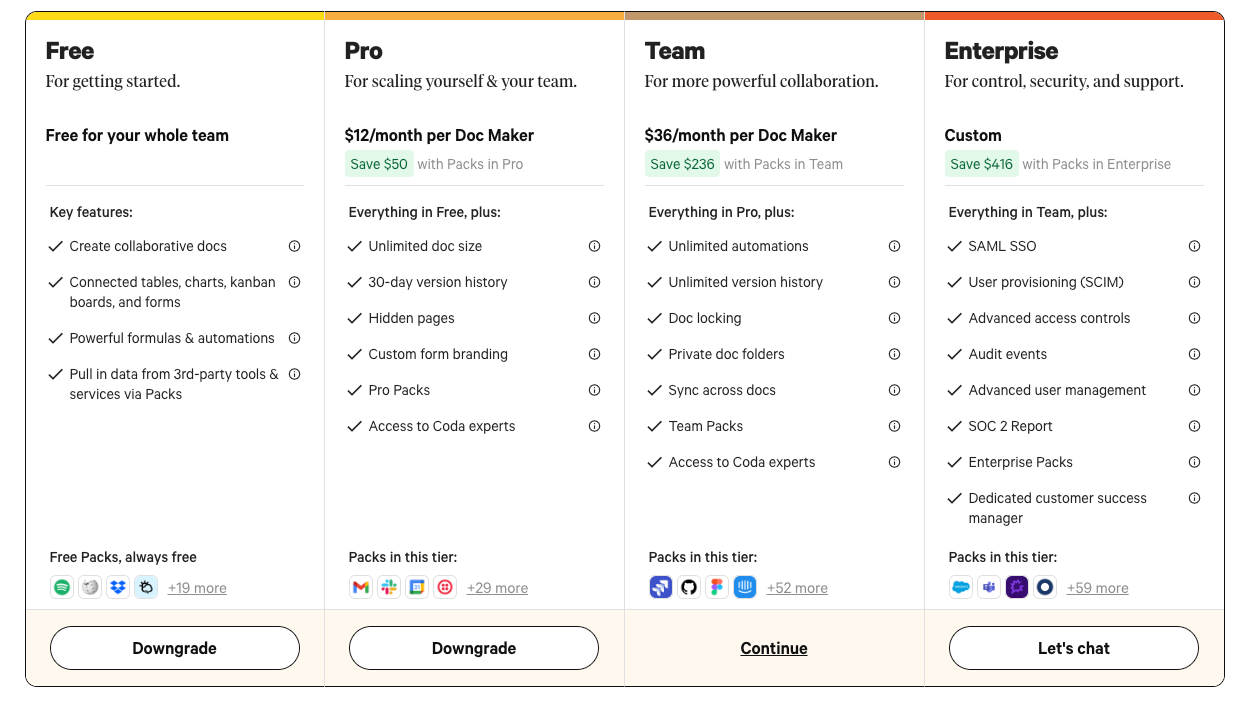Coda vs Notion
October 3, 2022
March 3, 2024
12 min
Coda vs Notion: Which Project Management Tool is Best for your Team?
Tossing up whether you should use Coda or Notion as a project management tool or for your team? By the end of the post, you will know which of the two tools will suit you best.
The pandemic brought about a titanic shift in the way that we work. More and more people working remotely entirely or a hybrid of in-office and at home. Organisations have increased need to use digital collaboration tools to achieve their goals, and many have turned to digital workspace apps like Notion and Coda.
Instead of having to have documents live in Google docs or Microsoft Word, spreadsheets live in Excel or Google sheets — relevant work scattered across various apps that can be hard to keep track of — tools like Coda and Notion allow all of this information to live in one super-powered workspace due to their extreme flexibility. They truly are playing in the space of ‘one app to rule them all.’ While there are a few other similar apps in the space, none quite offer the user-friendly customizability of Notion and Coda. At first glance, Notion and Coda might seem like very similar apps. There, however, some main differences between the two that may make you choose one over the other.
So how do they compare? In this battle of Notion vs Coda, which productivity tool comes out on top?
Coda vs Notion: Bottomline Upfront
Coda and Notion are both extremely powerful examples of workspace apps that organisations can use to run their entire operations. Both tools have steep learning curves but Notion is a bit easier to pick up. That being said, it might be worth sticking it out learning how to use Coda because of its more powerful formula language, ‘packs’ that power up and extend its capabilities, and workflow automations that make it the more powerful tool. Notion wins out in terms of general aesthetics and seems easier to use for organising pages, as is more ‘work-space’ focused versus Coda’s document-centred approach.
If you’re the work you are trying to do is more focused on documentation (like a wiki) and UX and design is a crucial factor in your choices, go with Notion.
If you care more about database functionality and automations, basically building your own internal apps, Coda is the obvious choice.
About Coda
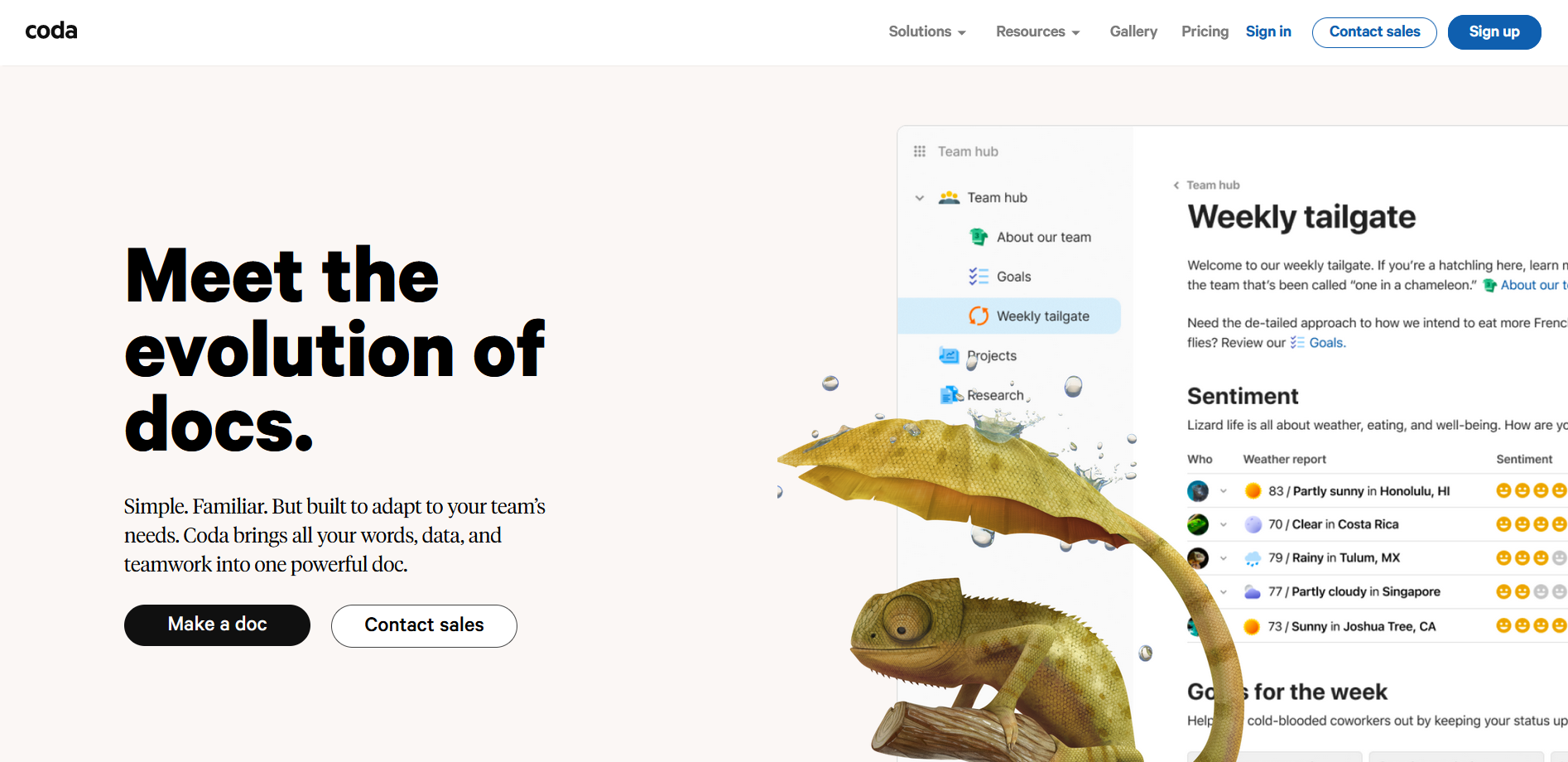
Coda’s homepage
Coda was first founded in 2014 by ex YouTube VP Shishir Mehrotra, but officially came out of beta in 2019. It is an app that combines spreadsheets with documents in a fluid way. The company describes itself as ‘The doc that brings words, data, & teams together’ and has upwards of 25,000 teams using Coda around the world.
At A Glance
Pricing
Between $12-$36 per doc maker (broken down into detail below).
Device Availability
Coda is available as a web app and is available on both iOS and Android.
Companies that use Coda
Tech companies like Uber, Figma, and Square, as well as publishers like The New York Times, Buzzfeed, and TED.
Capterra Rating
4.6/5
What people have to say:
“As a remote-first company, we have been using Coda for over 3 and it’s been an instrumental tool to help us scale and stay flexible operating our company.”
“My experience with Coda has been exceptional. I feel empowered by their resources to create exciting docs that have transformed our workflows, and if I ever have questions I know that Coda Support or the Coda Community will be able to help.”
“Having an all-in-one solution, compared to siloed info, ensures teams can better understand action OKRs and work transparently across the business”
About Notion
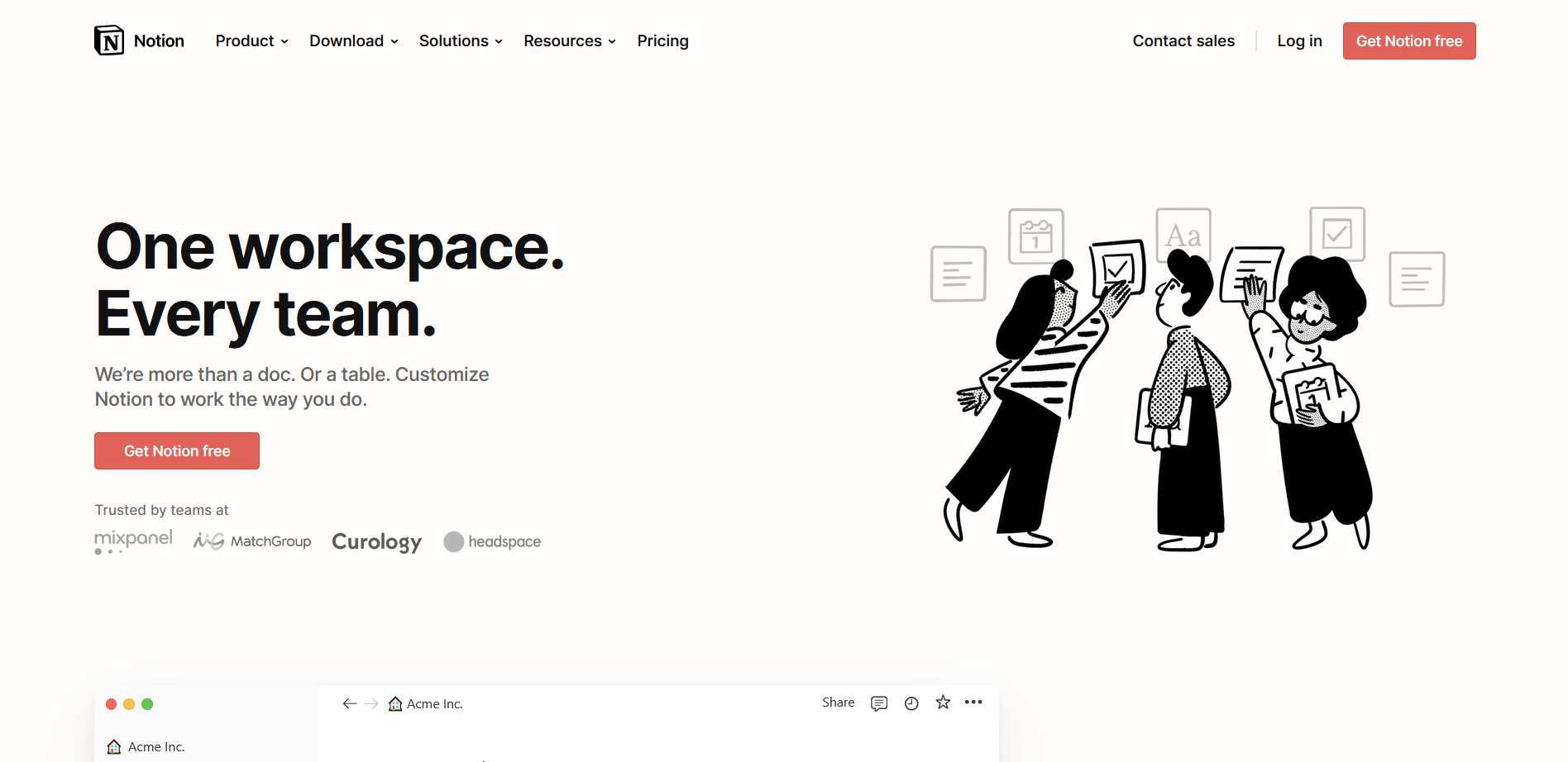
Notion’s homepage
Notion was the first of this type of all-in-one productivity tool to enter the world in 2016, and it caused quite a stir. It has been widely praised for its gorgeous design and user interface, and has transformed how people organize information, allowing to people to take notes, create to do lists, and replace spreadsheets in some instances. Originally a note taking tool mainly personal use, Notion offers teams the opportunity to create a central organising hub for all of their work.
Notion at a Glance
Pricing
$8 a month per user on their team plan.
Device Availability:
Available for download on Mac, Windows, iOS, and Android and works well in the browser.
Companies that use Notion
Pixar, mixpanel, Typeform, MatchGroup, and Headspace to just list a few.
Capterra Rating
What people have to say
“So far it has been a great experience for me and my team. Notion has turned into an app that is always open on the computer, just like the email client.”
“It allowed us to create a GTD system and keep the rest of the team on track with all projects and the combination of urgent tasks across active projects to make every day productive.”
Notion vs Coda — Comparisons
While these apps may appear to be extremely similar when you first look at them, the differences between the two are quite stark when you peer under the hoods of each.
So how do they stack up?
Docs and Blocks
Both Coda and Notion are built around the familiar document interface. If you wanted to, you could use either app to completely replace Google docs or Microsoft word. But they are both a lot more powerful, even when it comes to writing documents. This is because both tools take a modular approach where each page is made out of ‘blocks’. Blocks are lego-like building blocks of a document that can take a multitude of forms, from standard document-type elements like headings, lists and bullet points, images, to dividers, embedded videos and files, and most importantly tables/Databases (we will get to those in a second).
The vast array of block-types available in both Coda and Notion can be added by as simply typing forward slash. These apps allow you to build a document as fast as you’re able to type without the need for your hands to leave the keyboard whatsoever, at times. In both apps, the user is greeted with a calming blank page.
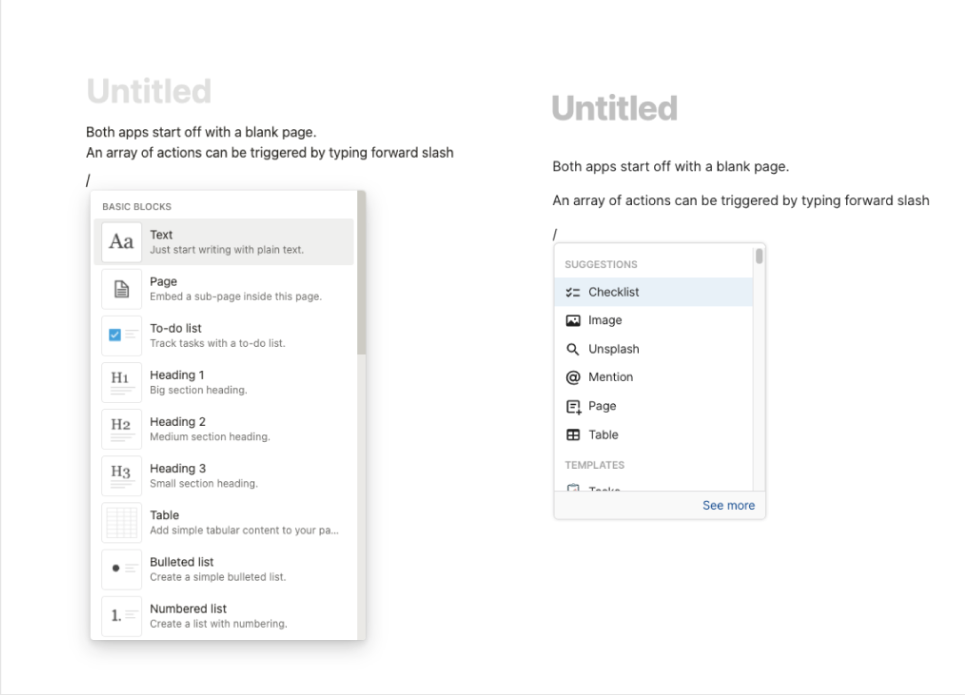
What a fresh doc looks like in Notion and Coda with the block options opened with a forward slash
It’s hard to put your finger on why, but the writing experiences in both Notion and Coda feel different. There’s something about the way Notion handles text that makes the writing experience more enjoyable overall.
Winner: Notion
Integrations, ‘Packs’, and Automations
The capacity for Notion and Coda to act as all-in-one productivity tools is that they are able to integrate with other tools companies are using on a day to day basis. This is probably where the two apps differ most dramatically in terms of their capabilities.
Notion allows for outputs from an array of tools to be embedded within their pages as a block. For instance, you can embed a Figma file, a Typeform, tasks from tools like Asana, Google Drive documents, etc. Being able to embed these tools makes it possible for Notion to be a central hub for all sorts of work, but doesn’t allow you to work with those tools more directly. Notion is more of a source of truth than an active interface.
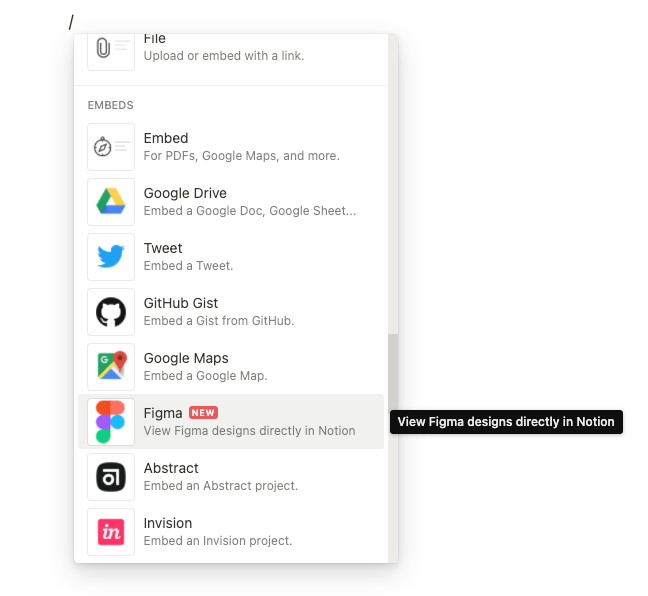
Example of some 3rd party embeds Notion makes possible
This isn’t the case for Coda because of what they call ‘Packs’. Packs are blocks that bring the power of other tools within Coda itself. For example, the Gmail pack allows you to send emails directly from a Coda doc, others sync all the data from your CRM into a Coda table of your choosing. You’re not limited to the Packs that are currently offered as well, because anyone can build a Pack with a bit of programming know-how.
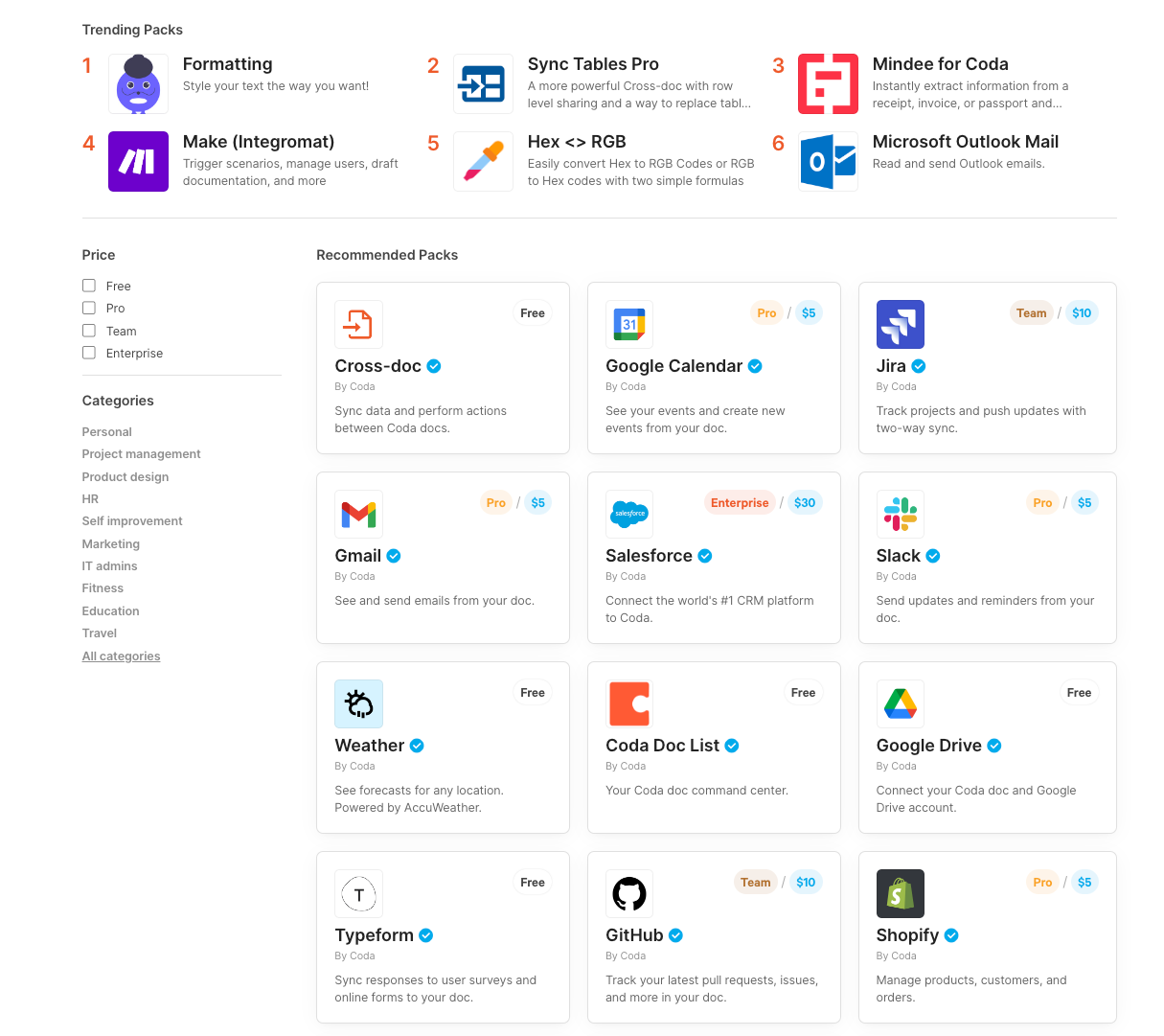
Examples of some of Coda’s Packs
Coda also has workflow automations built into the product itself, whereas Notion requires integrating with a tool like Zapier.
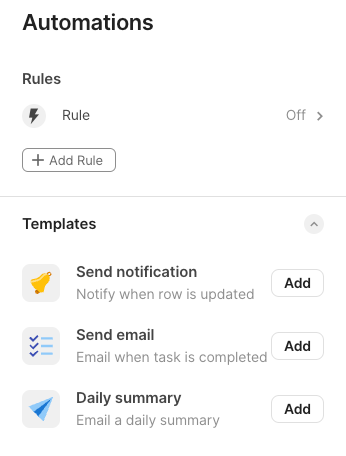
Coda’s automation panel
Last but not least, Coda allows users to create buttons which execute an action or entire process when pressed.
The combination of packs, automations, and buttons are the key differences between the two apps, ones that make Coda stand head and shoulders above Notion in terms of being ‘one app to rule them all’. These features make Coda a productivity tool you can use to build your own apps and unique workflows, whereas Notion is more of a place for documentation and tracking
Winner: Coda
Databases and Tables
The true power of these project management tools, which takes them far beyond traditional word processor or note taking applications, is rooted in their database functionality (or, Tables as they are called in Coda). Both apps allow you to effectively bring spreadsheet functionality into the document experience.
A table or database can be anything. They can range from a simple spreadsheet to the foundation of your entire team’s operations. Looking at some of the templates both project management apps have available gives some indication of the sorts of processes these tools are being used in. From OKR management, product roadmap planning, content calendaring, advanced to do lists, — there is a lot that you can do using a Notion database or Coda table.
Both Coda and Notion allow you to connect and reuse the data you have in a database or table across your workspace, while allowing you to view the data in different ways depending on the context. Coda calls this functionality ‘cross doc’, whereas in Notion they’re referred to as ‘linked databases.’
In both apps you’re able to choose various ‘views’ for each database or table. Some of the different views include kanban boards, galleries, and timelines.

The same recipe table in Notion, just using a different view.
Coda’s tables are more a lot more flexible. Coda tables have more field types, allow for conditional formatting, and, Coda’s formula language is leaps and bounds ahead of Notion’s. Their flexibility combined with packs, buttons, and workflow automations allow the creation of your own personal apps within your Coda workspace.

An example of a Coda table in action.
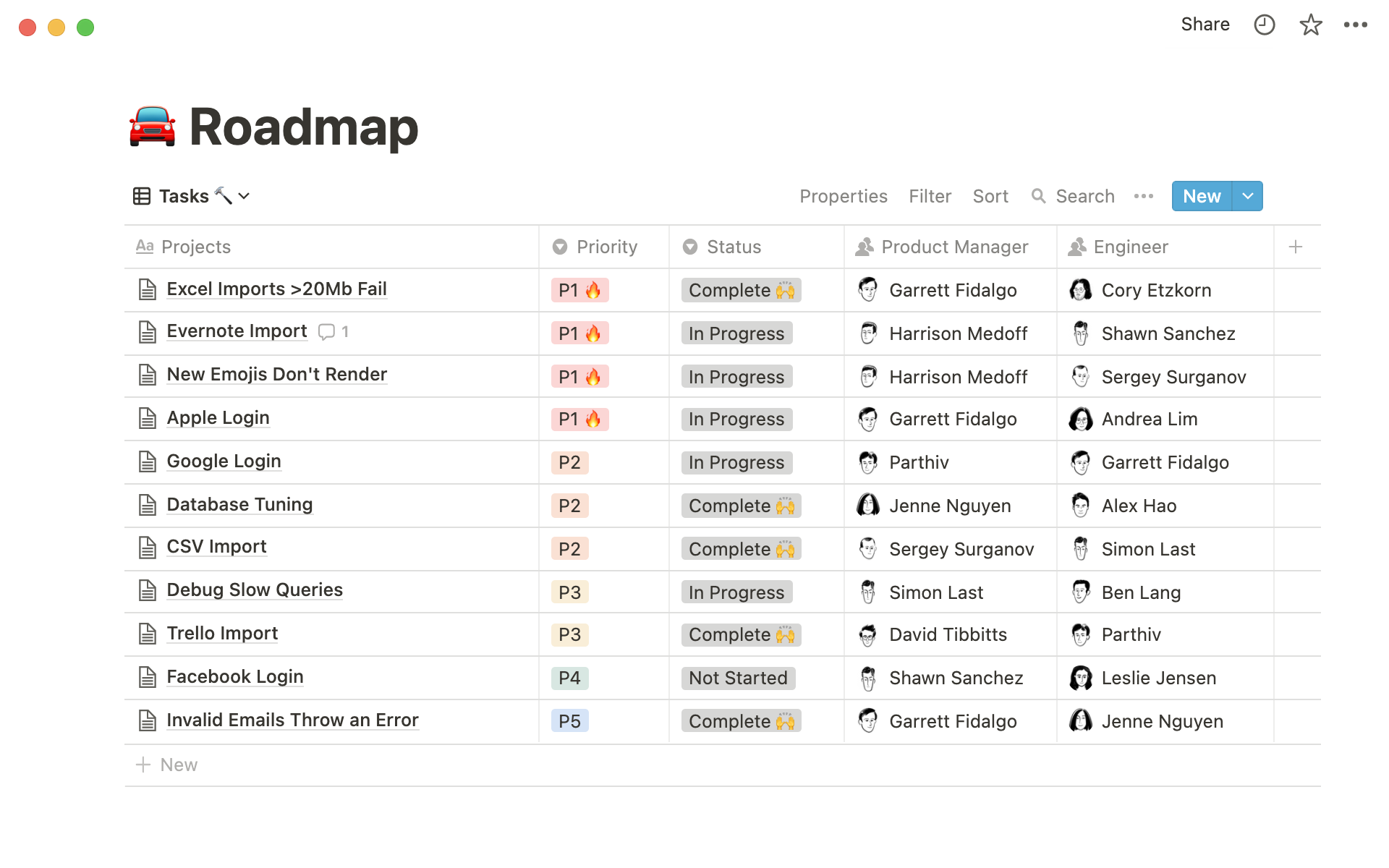
An example of a Notion database
In this Coda vs Notion matchup, Coda comes out ahead.
Winner: Coda
Templates
Staring at an empty page can be a bit overwhelming, especially when you’re working with apps like Coda and Notion. Fortunately, both tools allow you to create your own templates or offer huge amounts of templates you can use to get started. The categories of templates available for both range from marketing, product planning or project management, personal productivity, human resources, etc. Basically, there’s a template available for every business function.
Due to Notion’s huge and engaged community, it has far more templates you can use to get started with and draw inspiration from. On this front, Notion is a clear winner.
Winner: Notion
Learning Curve
The learning curve for both Notion and Coda is quite substantial when compared to both project management and note taking apps. But, of course it is. The key difference is that Notion and Coda allow you to build your own custom solutions.
The good news for both apps is that they both start off with an extremely familiar document interface. Both apps don’t force higher levels of complexity onto you, but they let you know that they’re possible.
Both Notion and Coda have very passionate communities that have created plenty of ‘how to’ blogs and videos online. Notion, having the far larger user base, has a lot more helpful content available online than Coda.
All things considered, though, Coda does seem to be harder to get the hang of, which is a sentiment that has been expressed across the internet. This could be due to the fact that Coda allows for more complex processes to be built.
Winner: Notion
Pricing
The difference between Coda and Notion is significant and worth emphasising. Notion’s pricing structure is more standard, charging $8 per user (billed annually).
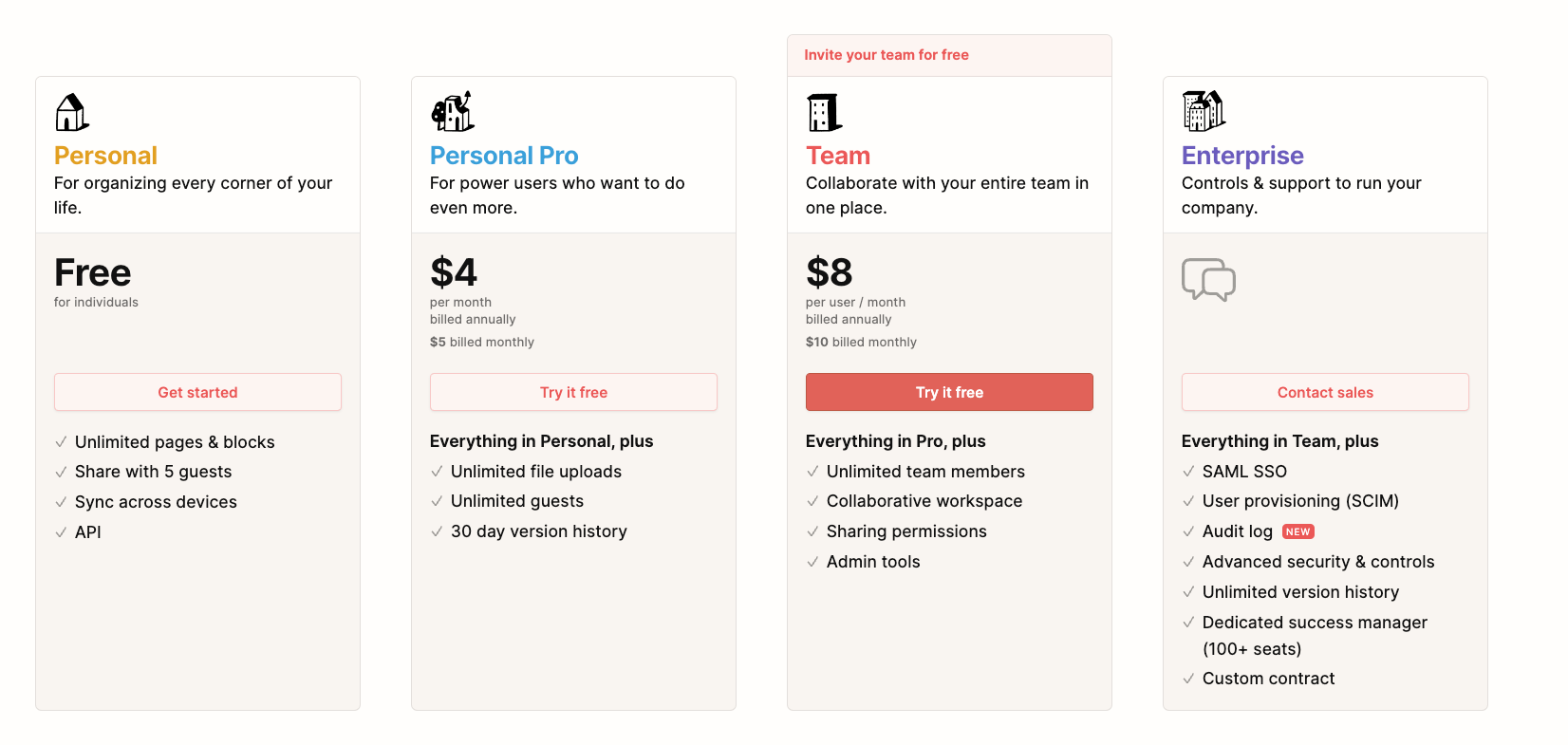
Notion’s pricing plans
Coda, on the other hand, has a very different pricing model. Coda charges only for the number of Doc Makers your team has, where a Doc Maker is someone who has the power to create docs. A team of six people, for instance, could have only 1 doc Maker but have all team members using the app.
Coda’s pricing for Docmakers range from $10 a month to $30 a month, depending on the subscription level. If you’re using Coda to run your organisation, the $30 plans makes sense as it includes things like unlimited automations, version history, etc.
Let’s say you run an organisation of 30, 6 of whom are managers, and you’re deciding between Coda or Notion. With Notion, it’s simple. You’d spend $8 per person a month, or $240 for the entire company. Coda’s pricing comes out to be a lot cheaper. If only the 6 managers need to be Doc Makers, you’d end up spending $180 a month at the top tier.
Both apps have a free version that you can use to test out both products.
Winner: Coda
Coda vs Notion — Conclusion
There’s no way I can provide the ‘right’ answer here. Chances are, someone in your team is already using one of these project management tools. Before you start trying to migrate your whole team or organisation to one of these apps, see which tool they’re using first. They might have some preferences, and one app might be better suited.
That being said, here are the core considerations when weighing up Coda vs Notion.
Coda is the obvious choice if you’re looking to build and automate processes in your company.
Notion is the choice for digital documentation and company knowledge management, or if your operations aren’t as process-heavy.
FAQs
Coda vs Notion: Which one is better?
It depends on what your needs are. Coda is better when working with data, Notion is better for digital documentation.
Do Notion and Coda have Free Plans?
Yes, both Notion and Coda have a free plan you can use to test out each product.
Can I use Notion or Coda to run my business?
Yes, Coda and Notion are some of the best workplace apps available to run your business.
